Today we’re going to look hard at what an avoidants idea of a healthy relationship is. More specifically we’re going to,
- Define What The Avoidant Disconnect Is
- Learn About The Self Fulfilling Prophecy Of The Anxious And Avoidant Relationship
- Learn Why They Want To Be Understood But Don’t Want To Reciprocate
- Learn To Actually Have A Healthy Relationship With An Avoidant
Let’s just jump right into it.

What Are Your Chances of Getting Your Ex Boyfriend Back?
Take the quizDefining The Avoidant Disconnect
I’ve talked in the past about what the avoidant attachment style is but perhaps the most clear cut way of visualizing this is by looking at a graphic we put together.
When we refer to “avoidants” we are really talking about a category within the attachment style theory.
According to Simply Psychology,
Attachment is defined as a “lasting psychological connectedness between human beings” (Bowlby, 1969), and may be considered interchangeable with concepts such as “affectional bond” and “emotional bond.”
A human being’s first attachment is often established during infancy with the primary caregiver; however, it must be noted that attachment is not unique to infant-caregiver relationships, but may also be present in other forms of social relationships. Attachments of various kinds are formed through the repeated act of “attachment behaviors” or “attachment transactions,” a continuing process of seeking and maintaining a certain level of proximity to another specified individual (Bowlby, 1969).
There are really four types of attachment styles,
- Secure
- Anxious
- Avoidant
- Fearful
But really we’re going to be focusing on the avoidant attachment style since you clicked on this article to learn about how they have this warped view of a healthy relationship.
First things first, it’s important to understand that for an avoidant healthy is often times synonymous with comfortable.
For them being able to have independence within their relationship is key. Of course, this often creates a bit of a paradox.
They want love, but they won’t let you close enough to give them that love and will often cite the lack of independence you’re providing them in the confines as a relationship as one of the reasons they want to leave the relationship.
And herein lies the disconnect we notice many of our clients have when they date an avoidant. They have trouble reconciling why things seem so great at the beginning of a relationship and devolved into one in which it seems their partner is drifting away.
So, if you haven’t figured it out by now but one of the areas where we are really educated is within breakups. In fact, for the past year I’ve been studying avoidants and how they approach relationships in their lives and came up with this self fulfilling cycle that they often get caught in.
The Avoidant Self Fulfilling Cycle They Can’t Escape
Now, before I pull up the graphic of the avoidants it’s important to understand that an avoidant will often fall victim to their programming.
They are literally programmed into thinking that emotional intimacy should be self sufficient. Now, what do I mean by that?
Well, as children the avoidant had caretakers that would provide the basic necessities like,
- Food
- Shelter
- Warmth
But that’s where things stopped which means that from an early age the avoidant had to learn to self soothe. Fast forward that to adulthood and you’ll find an avoidant has a misunderstanding of what a healthy relationship looks like.
They often will view “openness” as weakness and understanding that one fact will help us understand the self fulfilling cycle that they get caught in.
This cycle is what I consider to be the ring around the rosy that avoidants get caught in when looking at relationships.
It starts first with a need of love and slowly but surely devolves into an avoidance of intimacy. Here’s a more in-depth look.
- They start out wanting someone to love them
- They date you and things are great at first
- Eventually your need for open communication and intimacy triggers their avoidant side
- They begin to consider leaving the relationship
- They actually leave the relationship
- They are ecstatic that they left the relationship
- They begin to feel lonely and need to find a distraction for the loss
- They enter victim mentality and wonder why this is always happening to them
This is often what the life of an avoidant relationship will look like.

What Are Your Chances of Getting Your Ex Boyfriend Back?
Take the quizAnd it all stems from this mentality that the average person can’t comprehend.
They Want To Be Understood But Don’t Want To Reciprocate
In researching for this article I stumbled across this YouTube comment and something about it struck a nerve,
Specifically this statement from her,
Self-soothing is one of my main coping mechanisms
And that’s what I find so fascinating about people with avoidant attachment styles. Inherently they enter a relationship with good intentions. They understand subconsciously that they need support from other people in relationships and will take that support. Especially during this phase of the cycle,
This is why so often at the beginning of a relationship with an avoidant things seem great but as the relationship grows and becomes deeper and more emotional currency is required they begin to view you opening up or requiring more of them as a sign of weakness.
It feels unnatural to them to do that. After all, they’ve spent their entire lives self soothing. So, what often happens is that our clients in relationships with an avoidant will support the avoidant through difficult times but when they themselves go through difficult times the avoidant isn’t there to reciprocate.
And this behavior becomes more and more prevalent as the relationship becomes more serious which can be difficult if you don’t understand what’s going on.
The Avoidants Version Of A Healthy Relationship
Now, what I’m about to say can sometimes be misconstrued by people. I want to make sure that everyone reading this understands that an avoidants “view” of a healthy relationship is not actually what a healthy relationship should look like.
However, it’s how they view a healthy relationship.
Remember that comment I found when researching this article above?
Well, the woman (who classifies as a dismissive avoidant) said something super interesting. She basically gave, word for word, her view of what a healthy relationship looks like,
I’m actually really sensitive and emotional but sometimes dealing with emotionally charged situations can be unbearable, even physically sickening. To get along with us it’s important to not be too accusatory or impulsive, accept our boundaries and be careful with criticism. Clinginess has a tendency to make us want to run. Don’t try to force us to open up, be dependable, take us seriously and be vocal about your needs. Emotional expression and care doesn’t come naturally to us.
Essentially the best way to sum up the way an avoidant will view a relationship is that they want to be understood but want you to take care of yourself.
This leaves a lot of people unfulfilled because there’s a certain level of reciprocation required within relationships that is expected and avoidants don’t enjoy doing that at all.
This of course begs the question of how you can get an avoidant to open up to you.
Secure Attachment Gravity Concept
For those of you who are familiar with my work this won’t be anything new.
Take a look at this graphic again,
This indicates that there are really only two types of attachment style categories.
- Secure Category
- Insecure Category
Notice how in the “secure” category there aren’t really any other types of sub categories.

What Are Your Chances of Getting Your Ex Boyfriend Back?
Take the quizThat is because the end goal from an attachment theory perspective is always to take an insecure attachment and move it towards being more secure.
Of course, you can’t simply change your attachment style alone, you need help.
Attachment styles are formed in relationships, maintained in relationships and reformed in relationships.
In other words, someone with an attachment style that is avoidant needs help to turn that attachment style into being a more secure one. Hence, my concept of secure attachment gravity.
I’ve always viewed secure attachment styles as the gravity upon which insecure attachment styles are drawn to. Similar to a solar system. Notice how in the graphic above the insecure type of attachment styles are naturally drawn towards the secure one.
That not only applies to attraction forces but also attachment forces.
It’s only through being with someone who has a secure attachment style that the avoidant learns more secure characteristics. Of course, as pointed out by one of my clients here,
So this is from experience being with secure people as a fearful avoidant. I didn’t feel it made me more secure, it’s just I didn’t get triggered as much. I feel like those are different things and I think it misleads people into thinking that if they are secure their partner automatically becomes secure. Not necessarily, it just prevents triggers which help a lot in communication. The avoidant partner has to analyze their own behavior. Personally my secure partner of 3 years did not fix my issues. Questioning my own perception did.
This is a comment we received in our private facebook support group and I attached it here because there’s one part I actually disagree with.
We know from research that attachment styles shift based on your interactions with other attachment styles. However, I think the client is correct in saying it’s not an automatic process. What we tend to see happen is that if you are the secure style in a relationship with an avoidant your secure tendencies will force the avoidant to do the self analysis required to be aware of some of the avoidant gaps.
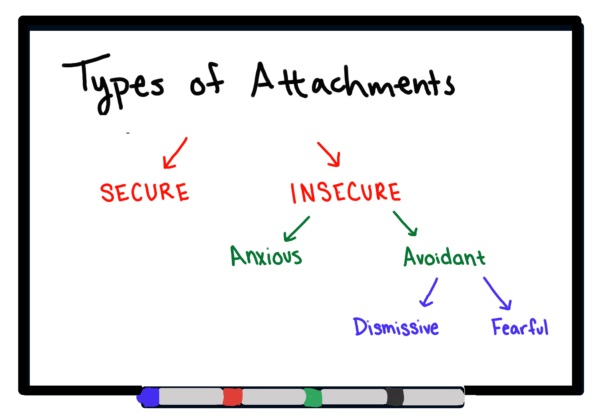
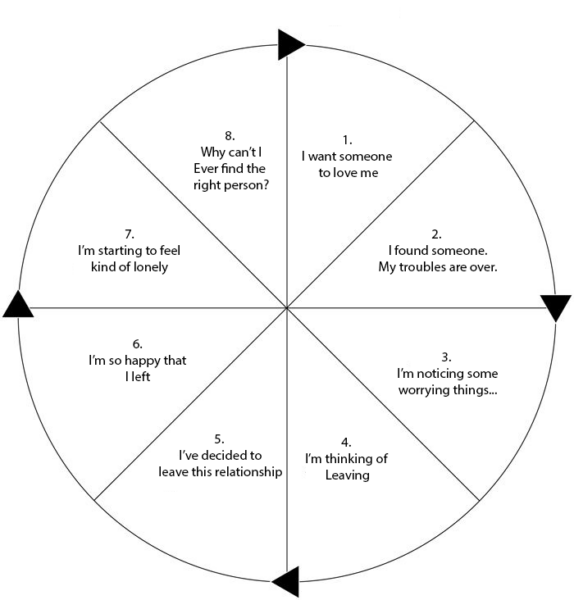

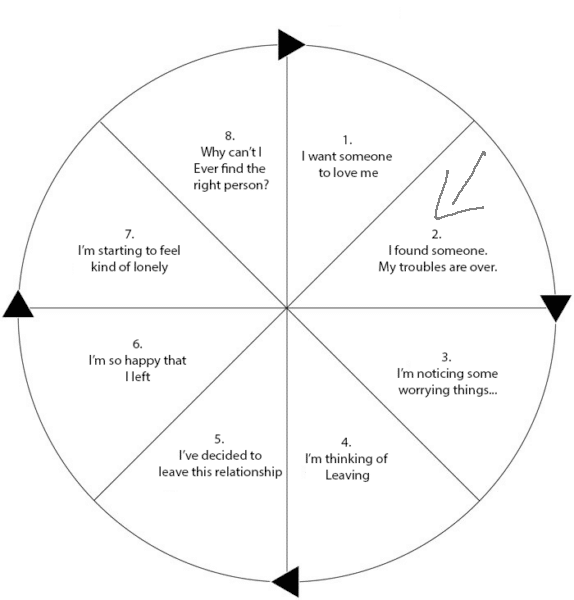

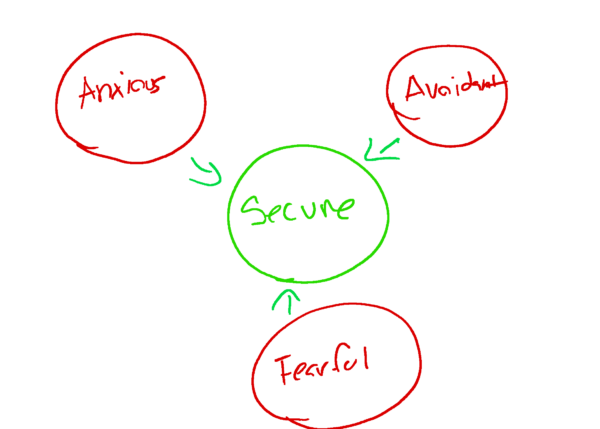
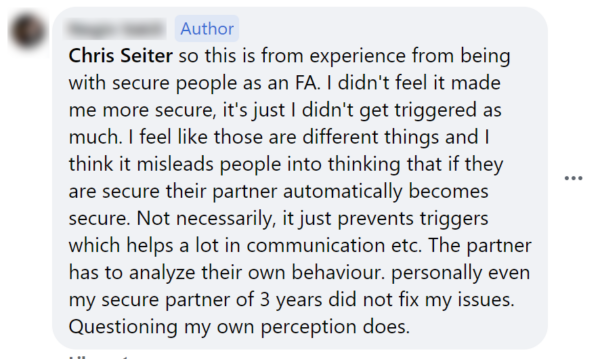
Gigi
November 6, 2024 at 6:30 am
I am disappointed that the author mentioned that avoidants want to be understood but want you to be self sufficient and then went on to say everyone else needs to help the avoidant open up. Helping them to open up is not the issue. Getting them to give a flying fig about other people after the honeymoons stage and love bombing are over is the issue.
Meagan
March 8, 2022 at 2:55 pm
My ex fiancé and I were together for 6 years. We have 2 children together. My ex currently lives with me and has been the entire time we have been split (3 months.) My ex, before he broke up with me was very distant. He lacks communication. I thought he was sleeping around, he says he wasnt/isnt and I believe him. For some strange reason….
He says the reason why he broke up with me is because of his mental health. Since he turned 30, a year ago. He has been panicking about aging and now he feels like he is gonna die soon. And has panic attacks every night about it. Because of this fear, he says he doesnt know what he wants.
He has been very hot and cold with me. I am a very anxious person, so I told him I would wait for him while he figures out what he wants. I just dont know what to do. I feel like I keep pushing him further and further. What makes it even more difficult is we live together and we dont have anywhere else to fo at the moment.